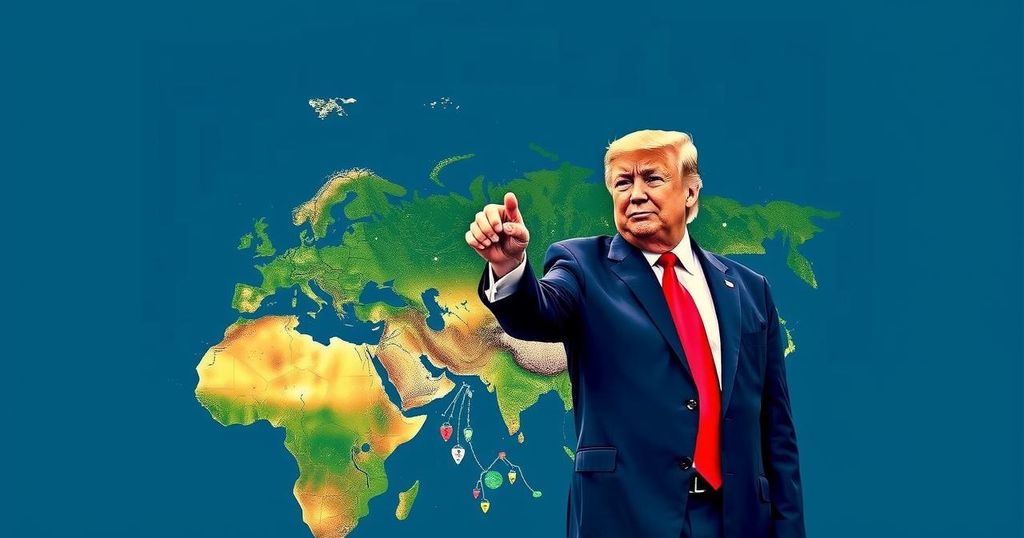As Donald Trump reenters the political arena, China is set to capitalize on the potential shift in climate diplomacy. The COP29 climate talks in Azerbaijan showcase China’s strategy to emerge as a global climate leader by revealing past climate finance contributions while resisting donor reclassification. As geopolitical tensions rise between China and the U.S., experts foresee a complicated path ahead for international climate negotiations, with climate leadership dynamics poised to evolve significantly.
As Donald Trump is poised to recommence his presidency, a notable shift in climate diplomacy is anticipated, with China poised to seize this opportunity. During the COP29 climate talks in Azerbaijan, China has taken a more collaborative stance, revealing details about its international climate financing for the first time, while still resisting reclassification as a donor state. This approach marks a departure from its sometimes confrontational stance in recent discussions. Given that the United States and China account for a staggering 41 percent of global greenhouse gas emissions, the dynamics of their relationship will significantly influence future climate negotiations. The optimism following the previous COP28 discussions, where China and former US envoy John Kerry collaborated for a common cause, is likely to diminish once Trump assumes office again. Trump’s past skepticism towards foreign assistance, partnership with China, and belief in climate change raises concerns about global cooperation. Belinda Schaepe, a China analyst from the Centre for Research on Energy and Clean Air, noted, “Trump’s election opens up an opportunity for China to step up into even more of a climate leadership role”. At the Baku talks, pressures mounted on wealthy nations to enhance their climate finance commitments beyond the current goal of $100 billion annually for severely impacted developing nations. China has maintained a rigid stance against being regarded as a donor country, fulfilling the obligations tied to that categorization. During his address in Baku, Vice Premier Ding Xuexiang disclosed a figure of $24.5 billion that China has contributed towards international climate finance since 2016. Such declarations have prompted reactions from international negotiators, suggesting that transparency and credibility are critical components of effective climate action. Despite China’s resistance to altering its developing country status, calls are emerging for China and other net emitters to increase their contribution based on their capabilities. Susana Muhamad, Colombia’s environment minister, expressed, “Not only China, but also Gulf nations and other countries should give in line with their capabilities”. As the climate negotiations evolve, Trump’s anticipated withdrawal from the Paris Agreement could catalyze other nations to step up, with China committed, at least rhetorically, to the multilateral process. With Chinese climate strategies rooted in addressing its environmental challenges, the nation has swiftly ascended as a leader in clean energy, particularly within the electric vehicle and solar industries. However, experts warn that geopolitical tensions between the US and China, as well as China and the EU, may increase. Li Shuo from the Asia Society Policy Institute has noted that while the political climate may worsen, a US exit under Trump could paradoxically create more space for climate negotiations, given the United States’ more extreme stance on various issues. In summary, as diplomacy shifts following Donald Trump’s anticipated return, China appears ready to assume greater responsibility in global climate leadership, although significant challenges and tensions remain ahead in the evolving international landscape.
The article discusses the dynamics of climate diplomacy as it pertains to the expected return of Donald Trump as President of the United States. It highlights China’s strategic positioning as a global leader in climate initiatives amidst shifting U.S. policies towards international agreements and funding. The backdrop of ongoing climate talks, particularly COP29 held in Azerbaijan, sets the stage for unfolding geopolitical strategies surrounding climate finance and international cooperation. The historical context of China’s development in relation to its carbon emissions status and its emerging role in clean energy advancements also provides insight into the tension between developed and developing nations in climate negotiations.
In conclusion, as the political landscape transforms with Trump’s return to power, China is positioning itself to take a more prominent role in climate diplomacy. The dynamics between the United States and China will likely shape future global discussions on climate action, financing, and responsibilities. While challenges persist, particularly concerning transparency and the classification of nations, the scenario presents an opportunity for China to emerge as a leader in addressing climate change, responding to both domestic needs and international pressures.
Original Source: www.france24.com






